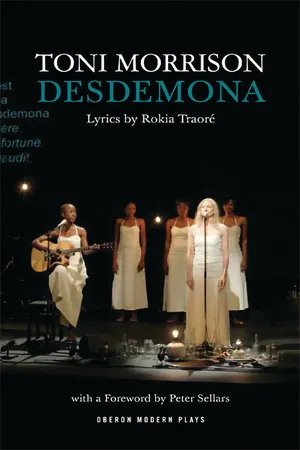Desdemona
About this book
The story of Desdemona from Shakespeare's Othello is re-imagined by Nobel Prize laureate Toni Morrison, Malian singer and songwriter Rokia Traoré, and acclaimed stage director Peter Sellars. Morrison's response to Othello is an intimate dialogue of words and music between Desdemona and her African nurse Barbary. Morrison gives voice and depth to the female characters, letting them speak and sing in the fullness of their hearts. Desdemona is an extraordinary narrative of words, music and song about Shakespeares doomed heroine, who speaks from the grave about the traumas of race, class, gender, war and the transformative power of love. Toni Morrison transports one of the most iconic, central, and disturbing treatments of race in Western culture into the new realities and potential outcomes facing a rising generation of the 21st century.
Tools to learn more effectively

Saving Books

Keyword Search

Annotating Text

Listen to it instead
Information
1.
| DESDEMONA | My name is Desdemona. The word, Desdemona, means misery. It means ill fated. It means doomed. Perhaps my parents believed or imagined or knew my fortune at the moment of my birth. Perhaps being born a girl gave them all they needed to know of what my life would be like. That it would be subject to the whims of my elders and the control of men. Certainly that was the standard, no, the obligation of females in Venice when I was a girl. Men made the rules; women followed them. A step away was doom, indeed, and misery without relief. My parents, keenly aware and approving of that system, could anticipate the future of a girl child accurately. | |
| Small, uninhabited, | ||
| envious of manhood, | ||
| weakened. | ||
| You are unworthy of the femininity | ||
| that you haven’t recognized in yourself, | ||
| that you distort, | ||
| that elevates and softens | ||
| your sad bitterness. | ||
| Though it feels strong, | ||
| beautiful and worthy, | ||
| we see your confusion, | ||
| sadness and hurt. | ||
you could hardly have achieved more, accomplished more. Manhood in itself is not a plus. Womanhood never imagined itself as an obstacle. “Girl” does not know how to be less than “boy”. Together, they were chosen to give meaning to life. | ||
who is strongest? Between He who represents strength and She in whom all strength is rooted, grows, and is given meaning and purpose? | ||
He, who claims supremacy here below, or She, without whom there would be no life here below? | ||
finesse with obedience, discretion with ignorance, tenderness with submission, seductiveness with prostitution, woman with weakness? | ||
2.
| My mother was a lady of virtue whose practice and observation of manners were flawless. She taught me how to handle myself at table, how to be courteous in speech, when and how to drop my eyes, smile, curtsey. As was the custom, she did not tolerate dispute from a child, nor involve herself in what could be called my interior life. There were strict rules of deportment, solutions for every problem a young girl could have. And there was sensible punishment designed for each impropriety. Constraint was the theme of behavior. Duty was its plot. | ||
| M’BIFO | ||
| I thought that strength was in unity. | ||
| I thought that having you at my side | ||
| could keep me far from my solitude | ||
| and my fears | ||
| Now I know that love | ||
| can be a source of evil. | ||
| I love you. | ||
| I forgive you. | ||
| I wanted to be with you, forever. | ||
| My outstretched hands waiting to be filled | ||
| are empty of disillusion. | ||
| But I still love the idea of love. | ||
| Her spacious heart drained and sere, Barbary died. I mourned her so deeply, it trembled me. And yet, even in grief I questioned: were we women so frail in the wake of men who swore they cherished us? Was a lover’s betrayal more lethal than betrayal of oneself? I did no... | ||
Table of contents
- Front Cover
- Half-title Page
- Title Page
- Copyright
- Contents
- Foreword
- Chapter 1
- Chapter 2
- Chapter 3
- Chapter 4
- Chapter 5
- Chapter 6
- Chapter 7
- Chapter 8
- Chapter 9
- Chapter 10
- Toni Morrison
- Rokia Traoré
- Peter Sellars
Frequently asked questions
- Essential is ideal for learners and professionals who enjoy exploring a wide range of subjects. Access the Essential Library with 800,000+ trusted titles and best-sellers across business, personal growth, and the humanities. Includes unlimited reading time and Standard Read Aloud voice.
- Complete: Perfect for advanced learners and researchers needing full, unrestricted access. Unlock 1.4M+ books across hundreds of subjects, including academic and specialized titles. The Complete Plan also includes advanced features like Premium Read Aloud and Research Assistant.
Please note we cannot support devices running on iOS 13 and Android 7 or earlier. Learn more about using the app
